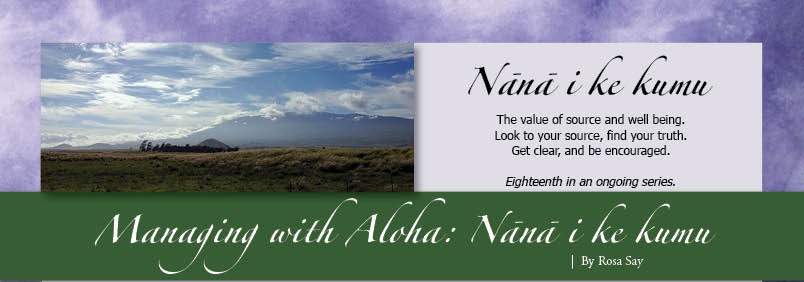
Managing with Aloha: Nānā i ke kumu
 We’ve covered 16 values inherent in the Managing with Aloha business philosophy.
We’ve covered 16 values inherent in the Managing with Aloha business philosophy.
There are three more, all which bring sharper clarity to the others—they seek to ground you, and bring you a job-well-done’s satisfaction and contentment.
For a business, this means they can significantly sort out, then solve any disconnection existing between how a company operates, and how all its stakeholders believe it should operate ethically, morally, and in human awareness of place-related contexts. Those stakeholders include staff, all partnerships, and those in a business’s surrounding community.
We start with Nānā i ke kumu, the value of well being, core value driver of that familiar island phrase “sense of place,” a concept undeniably woven into everyone’s sense of belonging.
Literally translated, Nānā i ke kumu means ‘look to your source’ recognizing an inner wellspring inside each and every one of us. We look within, and self reflect to get healthy, in body, mind and spirit. This is one’s wellspring of identity and intuition, intellect and emotion, values and beliefs, lessons learned and ancestral knowledge, all personal and professional alike.
Nature is where it all begins for most islanders, and the Hawaiian people are no different. We call ourselves keiki o ka ‘āina, children of the land, understanding that our roots are within the land, and we grow shaped by our environment. In Hawai‘i the ‘āina is not just soil and sand, lava rock and dirt; the ‘āina is a statement of heart and soul for us. The very word brings forth deep emotion: Aloha ‘āina are our words for love of the land, for it is with Aloha we share the breath of life, understanding ‘āina gives us life and provides sustenance. In this way, humanity and nature are considered father and mother, soul, and spirit.
When I moved from O‘ahu to Hawai‘i Island, I had the privilege of attending classes taught by the late Dr. George Kanahele, highly respected scholar and civic leader of the Hawaiian renaissance of the 1970s whose Ho‘ohana at the time of these classes—the early 1990s—was within the field of organizational consulting.
The definition he shared for ‘āina as place has always struck me as being concisely intuitive and easy to remember. He said that ‘sense of place’ involves both the feel of a place, and the feel for a place. He taught us that place is personally defined for people by their own “locational experiences,” bridging of and for. He urged our business team to open our company with a spirit of hospitality creating fertile ground for stakeholders to gain place-connected experiences while they were involved with us. They could then feel for themselves what the Aloha spirit was all about, of and for. He explained this as key to being “culturally correct” in the way we shared Hawai‘i with visitors as well: A guest experience could be a locational experience too.
The words “sense of place” echo much farther back within my consciousness; I cannot tell you when I first heard them, for it seems they’ve always been there. Beyond words, they’ve been more of an assumption for me, something I have—something I need—to help me grow in respect for Hawai‘i, land that gave me birth and nurtured me as I grew. And beyond paying respect, to Mālama her, honor and care for her whenever it is in my power to do so.
Therefore, when I hear the phrase Nānā i ke kumu, I know I must consider my emotional sense of place as well as my intellectual honesty and reasoning. In this regard, I am no different from most within our Hawai‘i communities, whether they be keiki o ka ‘āina, kama‘āina, or malihini. Each person has a connection to this place; all have deliberately chosen to be here.
When a child is troubled and hesitates to say just what the problem is, Hawaiian elders will often say “Nānā i ke kumu.” They are saying, “Find a place where you can sit quietly, and look within yourself for the source of what troubles you, for there you will also find strength within your inner spirit with which to deal with the trouble.”
Do this for your business, and you will get in arm’s reach of Pono, the value of rightness and balance. Not only does Nānā i ke kumu encompass source and explain culture: It describes your full capacity moving forward.
Initiate the Nānā i ke kumu conversation with your team. The calendar conspires right now, and the holiday spirit warms us and comforts us; a perfect time to explore the guidance of Nānā i ke kumu together. Be a part of your community. Watch, listen to understand. Discover their needs, needs your business is perfectly suited to fulfill in serving them.
~ Rosa Say
Next issue: Pono, the value of rightness and balance.
Contact writer Rosa Say, Managing With Aloha


